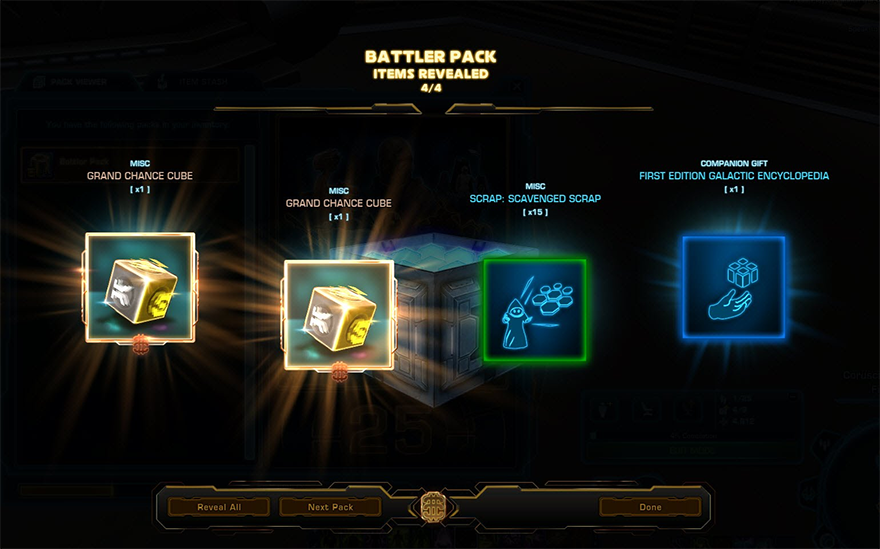
Lockboxes have become a hot topic over the last couple of years. Last month, both our writers and readers crowned SWTOR worst business model of the year in part over its lockbox shenanigans. And several business model and lockbox-related articles made it into our list of most-commented-on articles of the year, including the Daily Grind on lockboxes and gambling.
So where do we draw the line between gambling and hobby gaming? Why are lockboxes acceptable? Are they really something MMO developers should continue to use in order to monetize their games?
I’ve done some research and even gotten some expert legal opinions about this based on American law (and some international), and I can’t say I’m entirely happy about my results.

Is gambling really a problem?
In real life, I don’t go to casinos unless they’re attached to a sweet hotel or restaurant. I’ve never bought a lottery ticket. I don’t do slots, and I don’t even know how to play poker. However, I play video games, and gaming is becoming a tool the gambling industry wants to leverage to draw more people to them, including current minors. In fact, as we’ve discussed, gambling was one of the early vices people compared video games to in terms of addiction. The line between game and gamble is becoming more blurred as games become more reliant on lockboxes and other similar, random chance systems as an overt, direct income source (as opposed to just a game mechanic). In fact, the blur once caused Greece to actually ban video games at one point. It’s one thing if you’re targeting adults, but it’s another when companies are looking to games to disguise gambling and sell it to kids.
Another author might turn this into a morality piece on why gambling is bad, but the truth is, it’s not. We take risks in our everyday lives. It’s a survival thing, and turning that into a game helps you practice the mental preparation involved in risk taking before it’s a life or death situation. It’s partially why games of chance can be fun.
Practically speaking, the problems arise when gambling is tied to money. This is business, and one that’s quite profitable. The odds are literally stacked against the player to convince them to gamble and lose their money. Ignoring the potential for addiction and any moral arguments, I’m primarily concerned with exploring this topic as a business that produces a game with little to no strategy, asks an entrance fee, and purposefully intends to give the average player little to nothing back. It’s not about right or wrong but customer value. If an adult understands the system and wants to play that kind of game, that’s fine. However, we have laws protecting youth from these “games.”
Carnival games may be rigged, you might point out, and you’re right — in fact, that helps to highlight several issues:
- When do we move from a game of skill to a game of chance?
- When is a game of chance legally acceptable?
- How does a game of chance affect a child differently than an adult?
I spoke with James Gatto of Sheppard, Mullin, Richter & Hampton LLP and game lawyer Zachary C. Strebeck about the first two issues and how they relate to video games. I also did a little research about the third issue for you parents and teachers out there.
Games of chance vs. games of skill
There’s already plenty of public information about American gambling definitions thanks to Mark Theoharis, but Strebeck breaks down for me what constitutes illegal gambling rather nicely:
“An illegal lottery in the US consists of three elements – 1) some kind of consideration (money or something of value) for entry, 2) random chance, and 3) a prize with some value. Usually, companies change out one of these in order to avoid illegality. For instance, if you remove the consideration for entry by allowing free entries, you have a sweepstakes. If you remove the chance element, you have a contest. If you remove the prize, then there isn’t much of anything at all.”
The random chance part is where skill comes in. As Theoharis notes, just because a small group of skilled experts can consistently beat the odds doesn’t mean courts will rule that the game is a one of skill. Instead, courts rely on whether or not the average player can win via skill.
I couldn’t get any legal experts to directly confirm this, but there were hints through some examples that what separates gaming from this system is that the “prize” affects a secondary game. That is, you have the base game that can be played, and it may be argued that the core game is one of skill. However, inside the game, you may have lockboxes that give very powerful items that will severely impact how much skill accounts for in the game, which in my mind could theoretically threaten the skill portion of the game. This is only the start of where gambling definitions and gaming get muddied.

Defining games and gambles
Determining what’s a legitimate game and what’s simply gambling in terms of video games is far from cut-and-dried, in other words. Internationally, it’s becoming even less clear. Korea’s had a bit of a history with real money trading (RMT) and gambling, with the two often being confused, though RMT supported games have been forced to drop that feature when porting to Korea on occasion. This alone should be a sign that developers need to rethink monetization strategies.
In 2012, Japan went after “gacha” mechanics, which are basically lockboxes or booster packs. While MMOs weren’t the primary target, gaming was in mind, and it affected DeNA, a large Japanese mobile game company. As mobile gaming was much more common among the people I knew in Japan compared to console gaming (PC gaming was nearly non-existent), that should make it clear that the Japanese government is aware of developers using business practices that aren’t sitting well with people.
Like Greece before it, Singapore passed a law in 2014 that was worded so broadly that it could affect many games that included any “game of chance” that required money, which could conceivably include games that sell lockboxes or boosters.
Most concerning for MMO gamers is the fact that China has recently gone after RMT for random rewards in video games, not long after Elder Scrolls Online added them. I’m sure the two aren’t directly related, but unlike previous countries passing such laws, China seems aware that its new one is affecting MMOs, as it specifically (through translation) mentions “online games.” However, China’s had kind of a hardcore, cash-dependent MMO scene at times, so I’m not surprised it’s something its legislators would pay attention to.
As for America, Gatto constantly mentioned how nuanced the law can be. For example, he said that “[t]here are some cases that hold that if you spend virtual currency to obtain in game mechanics (spinning a virtual slot or other chance based activity, like lockboxes) and all you can win is more in game items (virtual goods/currency), it may not be illegal gambling.”
However, Strebeck told me that lockboxes are particularly problematic. The issue isn’t just about whether or not real currency is required to purchase the items, but “whether or not there is any value there.” You can say that it’s just pixels or have a Terms of Use that says nothing in the game has a monetary value, but if there’s a secondary market where people are willing to pay hard cash for them, there does seem to be a value contrary to that claim.
When I mentioned booster packs for physical card games like Magic: The Gathering and the Pokemon TCG, where players have to pay for a random assortment of cards with potential values based on a secondary market, Strebeck said that “[card game booster packs] seem to fit, though there haven’t been any attempts to go after them” that he is aware of. That being said, he notes that the same could be said of collectible baseball cards, which aren’t even a game to begin with.
Going back to the lockboxes, there are some situations where they might be operating under terms that would deem them gambling, making them possibly illegal activities if done without the proper licenses, age verification, etc. Here’s what I asked Strebeck and his response:
The Terms of Use or End User License Agreements of most of these games spell out the fact that in-game ‘virtual’ items have no value. Many explicitly forbid the trading or sale of any user accounts or virtual currency. However, even if the selling of these virtual goods is against the terms and the goods are only licensed, secondary markets often sprout up for these goods. Does this create ‘value’ and make it an illegal lottery?
Strebeck: Possibly. There are a few cases dealing with this. Courts have found that, despite a secondary market existing, there are factors making it not an illegal lottery: (i) the uncertainty of the secondary markets means that the virtual goods are not necessarily “prizes”, (ii) if the game as a whole is a game of skill, this supports a finding that it is not an illegal lottery, (iii) there is no cash-out feature for the virtual goods, and (iii) that if at the time of the transaction, even if the consideration was paid for with real money, the actual thing paid (the virtual currency) for the chance to win the prize had no value. Another court noted that suing a company for damages based on the user’s own breach of the terms of use (selling virtual goods on a secondary market) is contrary to basic legal principles. However, these are only from single courts, and further rulings can (and often do) contradict each other. Each state has its own laws with different wording, which could change the outcome. We simply don’t know.
That being said, Strebeck went on to mention that there have been several free-to-play game companies that have been “the subject of class action lawsuits.” State and federal regulators are also looking into these issues, such as with fantasy sports companies in New York, which were in fact considered illegal. However, Gatto mentioned that there have been cases where if the game company did not participate in the market or help promote it, they weren’t held accountable. This is, perhaps, why many MMOs can sell lockboxes but not be held accountable for secondary markets, while Counter-Strike Global Offense and Valve have been, even though the skins at the center of controversy don’t affect the skill-based game itself.

Player made secondary markets vs. company facilitated markets
Unfortunately, the opportunity for a game to have a secondary market that could make the game illegal is just the tip of the iceberg. It’s where my interviews tended to break down because of the specificity of the topic. For example, the state of Washington (which will come up again later) supported a social casino game in a 2015 lawsuit because real money transactions extended only game time. The court didn’t care that the chips were sold on a secondary market to other players.
Think about games in which you have to buy keys to unlock free boxes. Does that make the system less gambly? What if that key can also be free in the game? I’d think that having the keys potentially be free would probably help keep the game in the legal grey area of things. And what about the loot content? If the boxes can only be bought, but the contents can’t be sold, there’s no secondary market, right? That means games like Hearthstone and Overwatch should be immune from anti-gambling laws. In fact, another 2015 case in Maryland actually sided with a game that had an in-game casino. The fact that the law in California (where the plaintiff was from) had specific definitions of slot machines that the game didn’t meet gave an edge to the developers, as did the fact that it was a game within a game. Since the player wins items that, under the game’s EULA, have no value, combined with the other factors, the court dismissed the case.
However, if the cards can be traded or sold within the game and the company participates, such as in HEX, it seems they could be open to a lawsuit. Granted, this is all digital, through auctions, paid tournaments, and trades, but the game does sell a currency. I’m assuming that because HEX honestly feels more like a digital version of the comic-shop TCG tournament scene I experienced as a child than a casino filled with dicey games of chance, Cryptozoic feels safe. (They did not reply to my requests for comment ahead of publication.)
Generally speaking, for now, game developers should be safe unless they participate directly with the gambling. Once they do, though, it seems all these little grey areas go red. Because Valve’s Steam system facilitated the gambling of skins, the state of Washington could step in and tell Valve it crossed the line into gambling territory. The lawsuit against Valve was dropped, but Valve has had to do a lot of work to make sure it’s not struck with another threat of anti-gambling legal action, not just for CS:GO but for Dota 2 as well. While the skins don’t affect the game within the game, the game of chance within it benefited Valve monetarily. This seems to be why a state government could use anti-gambling laws against them.
Even if a company can’t be hit, those supporting it can. The fact that fandom personalities can be held accountable for creating abusive systems the game itself doesn’t support helps prevent secondary markets from affecting the spirit of the game, and that’s awesome. A combination of the two may be partially why EVE recently targeted players and organizations involved in RMT schemes.

Gambling and minors
While adults should have the option to do as they please with their money, most countries treat minors with a different set of rules. When companies try to bypass these rules, and the public learns of this, it can threaten the whole business. Think of our awareness of how we know advertising is used to target kids. There’s a developmental difference, and lack of experience, that separates children from adults.
But why do we protect minors from gambling but not TV, shopping, or sweets? All of these are things people associate with addiction, and addiction is generally the biggest reason I could find as to why gambling is considered “bad.” The problem is, as I’ve stated before, addiction is being looked at differently these days. Video game “addiction” is still something under debate, but even the debate is something researchers are saying isn’t something science can really support. If game addiction isn’t “real,” we’d need to go over gambling addiction’s validity too.
However, there’s another reason. Unlike adults, children often do not have to pay for shelter, food, electricity, and so forth, and may not factor in life necessities when gambling. Hobbies that are social and can be revisited/recalled are generally more socially acceptable, but also cost effecient.
Monetary gambling is an entrance fee a moment of entertainment, as long as a round of cards or a sports game or as short as the pull of a lever. Like a dungeon run, it’s something you’ll do often, and even if it’s with many people, it’s a grind you probably won’t remember; you’re mostly just losing time in exchange for pixels (or maybe a repair bill). Time may be lost to the gamer, but no one goes into debt for lost time. If children, who still haven’t had to balance daily finances let alone budget for entertainment, develop a habit for spending money on a system designed for them to lose, they can end up with serious financial issues that an adult is theoretically better prepared for.

The risk of relying on lockboxes
Considering what we’re seeing in Asia, Europe, and America, I think developers should seriously start looking at monetization models that don’t involve random games of chance. While American and European companies seem to need to worry about their games seeming like casinos, Asian games already have laws targeting their lockbox systems directly. RMTs are already under threat, but connecting them with games of chance puts companies in positions where lawsuits could affect the lifeblood of the game, if not at home than abroad. Preventing secondary markets outside of the game sadly may mean affecting trade, a system that feels required for true player interaction, but I would hope such vital systems can stay safe as long as a game can keep most of its monetization schemes feeling fair. That being said, companies that continue to flirt with the idea of using games to hide RMT gambling, especially in games meant for children, threaten not only MMOs but gaming as a whole.
















